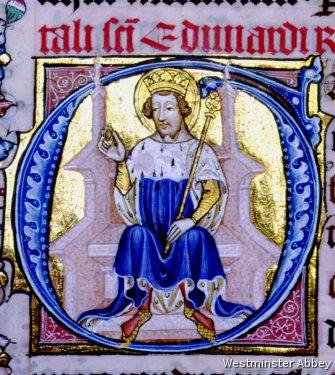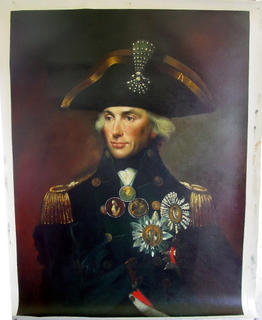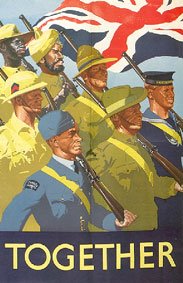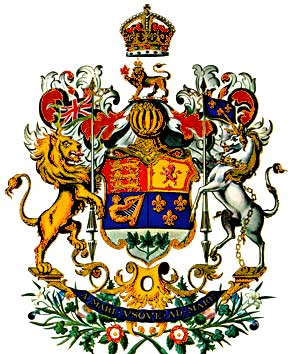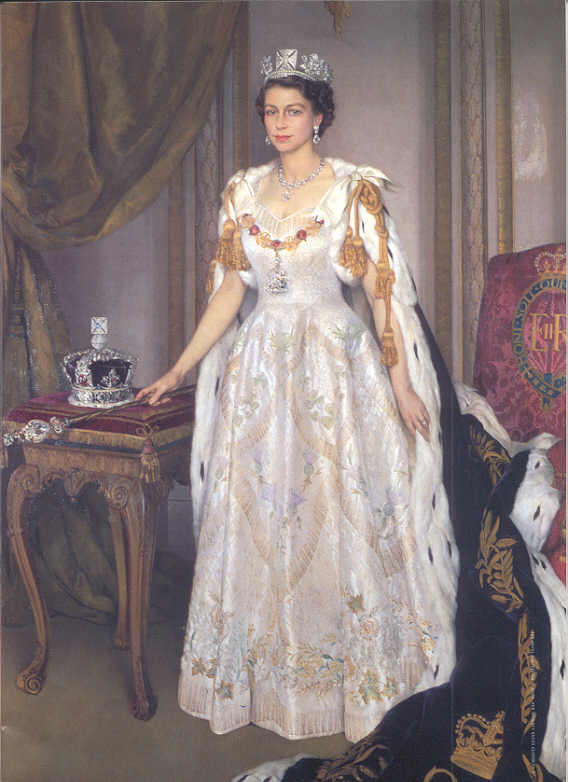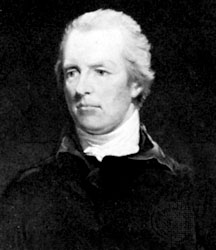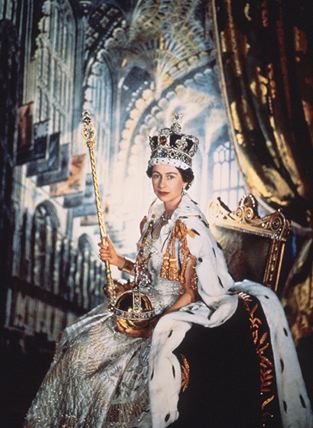[+] HONOURING OUR PATRON, SIR WINSTON CHURCHILL, VICTOR OF THE ENGLISH-SPEAKING PEOPLES
[+] HONOURING OUR QUEEN, ELIZABETH THE SECOND, ON THE 80TH YEAR OF HER BIRTH (1926 - 2006)
[+] HONOURING OUR KING, SAINT EDWARD THE CONFESSOR, ON THE 1000TH YEAR OF HIS BIRTH (1005 - 2005)
[+] HONOURING OUR HERO, LORD NELSON, ON THE BICENTENNIAL OF THE BATTLE OF TRAFALGAR (1805 - 2005)
[+] HONOURING OUR SONS, THE QUEEN'S COMMONWEALTH SOLDIERS KILLED IN THE 'WAR ON TERROR'
[+] HONOURING OUR VETS ON THE 150TH ANNIVERSARY OF THE VICTORIA CROSS (1856 - 2006)
 WHEREAS the longstanding tradition of representative monarchy as constitutionally practiced by the independent peoples of the United Kingdom of Great Britain and Northern Ireland, Canada, Australia, New Zealand and the other Realms of the Crown Commonwealth is continuously threatened by the unrelenting regressive forces around them, that left unchallenged will cause the venerable institution of monarchy, the most splendid form of constitutional government to have evolved on this Earth, to degenerate into a pathetic shadow of its former glory and inevitably or suddenly wither away;
WHEREAS the longstanding tradition of representative monarchy as constitutionally practiced by the independent peoples of the United Kingdom of Great Britain and Northern Ireland, Canada, Australia, New Zealand and the other Realms of the Crown Commonwealth is continuously threatened by the unrelenting regressive forces around them, that left unchallenged will cause the venerable institution of monarchy, the most splendid form of constitutional government to have evolved on this Earth, to degenerate into a pathetic shadow of its former glory and inevitably or suddenly wither away; AND WHEREAS a defeat for monarchy and for the people in any one Realm, is a defeat for monarchy and for all our peoples in all our Realms, we do hereby mutually proclaim therefore that any further acts of disloyalty carried out against our peoples as represented by their Sovereign, or any further encroachment by the political elite on their residual powers of State, or any further attempts to undermine the legitimacy, independence and dignity of their office, shall no longer be tolerated with gradualist abandonment, but fought vigilantly and honourably with dutiful obligation, bound by our undying affection, loyal devotion and true allegiance to Her Majesty, Queen Elizabeth II, Her Heirs and Successors.
GOD SAVE THE QUEEN.
Right. I'm tired of this here old blog. It's slow, it's clunky, it's partially inoperable. It's difficult to get in and make repairs. The html is all in longhand because I'm not a website design wizzard. I'm sick of the red lines and the sidebar buttons that won't open. Too much colour. Too little simplicity. Not enough elegance. Must take advantage of the accelerated design features of Beta. Besides, it's been almost two years now. I think it's high time we decommission T.M. and bring in version 2.0. What d'ya say? Should we throw the baby out with the bath water?
 Today is the 75th anniversary of the Statute of Westminster (sometimes referred to as the Treaty of Westminster outside the UK, though it was not in the form of a treaty), which came into effect on December 11, 1931.
Today is the 75th anniversary of the Statute of Westminster (sometimes referred to as the Treaty of Westminster outside the UK, though it was not in the form of a treaty), which came into effect on December 11, 1931.The Statute is of historical importance because it effectively marked the independence of the Dominion of Canada, the Commonwealth of Australia, the Dominion of New Zealand, the Union of South Africa, the Irish Free State and Newfoundland. Its current relevance is that it sets the basis for the continuing constitutional relationship between the Commonwealth Realms and the structure of the British Crown:
And whereas it is meet and proper to set out by way of preamble to this Act that, inasmuch as the Crown is the symbol of the free association of the members of the British Commonwealth of Nations, and as they are united by a common allegiance to the Crown, it would be in accord with the established constitutional position of all the members of the Commonwealth in relation to one another that any alteration in the law touching the Succession to the Throne or the Royal Style and Titles shall hereafter require the assent as well of the Parliaments of all the Dominions as of the Parliament of the United Kingdom
Most interestingly, on April 17, 2003, when Tony O’Donohue took Her Majesty to court over certain provisions of the Act of Settlement, 1701, on the grounds that they discriminate against Roman Catholics, and are in violation of the equality provisions of the Canadian Charter of Rights and Freedoms, Justice Rouleau ruled the case not justiciable:
The impugned positions of the Act of Settlement are an integral part of the rules of succession that govern the selection of the monarch of Great Britain. By virtue of our constitutional structure whereby Canada is united under the Crown of Great Britain, the same rules of succession must apply for the selection of the King or Queen of Canada and the King or Queen of Great Britain. As stated by Prime Minister St. Laurent to the House of Commons during the debate on the bill altering the royal title:Clearly the Act of Settlement and the Statute of Westminster are still central pieces of British legislation that carry constitutional weight for the Crown Commonwealth and its citizen subjects. They determine the core of how the monarchy functions, a continuing symbol of our fraternal unity and allegiance. We are now independent nations - have been for 75 years - but 75 years later we are not independent from the British Crown. The sentiment is gone, but the reality persists. Either we rediscover some of that lost sentiment, or we will discover a new reality.
“Her Majesty is now Queen of Canada but she is the Queen of Canada because she is Queen of the United Kingdom. . . It is not a separate office .. it is the sovereign who is recognized as the sovereign of the United Kingdom who is our Sovereign. . .” Hansard. February 3, 1953, page 1566.
These rules of succession, and the requirement that they be the same as those of Great Britain, are necessary to the proper functioning of our constitutional monarchy and, therefore, the rules are not subject to Charter scrutiny.
In the present case the court is being asked to apply the Charter not to rule on the validity of acts or decisions of the Crown, one of the branches of our government, but rather to disrupt the core of how the monarchy functions, namely the rules by which succession is determined. To do this would make the constitutional principle of Union under the British Crown together with other Commonwealth countries unworkable, would defeat a manifest intention expressed in the preamble of our Constitution, and would have the courts overstep their role in our democratic structure.
CHAPTER 4 OF THE STATUTES OF THE UNITED KINGDOM 22 GEORGE V
An Act to give effect to certain resolutions passed by Imperial Conferences held in the years 1926 and 1930.
11th December, 1931
WHEREAS the delegates to His Majesty's Governments in the United Kingdom, the Dominion of Canada, the Commonwealth of Australia, the Dominion of New Zealand, the Union of South Africa, the Irish Free State and Newfoundland, at Imperial Conferences holden at Westminster in the years of our Lord nineteen hundred and twenty-six and nineteen hundred and thirty did concur in making the declarations and resolutions set forth in the Reports of the said Conferences:
And whereas it is meet and proper to set out by way of preamble to this Act that, inasmuch as the Crown is the symbol of the free association of the members of the British Commonwealth of Nations, and as they are united by a common allegiance to the Crown, it would be in accord with the established constitutional position of all the members of the Commonwealth in relation to one another that any alteration in the law touching the Succession to the Throne or the Royal Style and Titles shall hereafter require the assent as well of the Parliaments of all the Dominions as of the Parliament of the United Kingdom:
And whereas it is in accord with the established constitutional position that no law hereafter made by the Parliament of the United Kingdom shall extend to any of the said Dominions as part of the law of that Dominion otherwise than at the request and with the consent of that Dominion:
And whereas it is necessary for the ratifying, confirming and establishing of certain of the said declarations and resolutions of the said Conferences that a law be made and enacted in due form by authority of the Parliament of the United Kingdom:
And whereas the Dominion of Canada, the Commonwealth of Australia, the Dominion of New Zealand, the Union of South Africa, the Irish Free State and Newfoundland have severally requested and consented to the submission of a measure to the Parliament of the United Kingdom for making such provision with regard to the matters aforesaid as is hereafter in this Act contained:
NOW, THEREFORE, BE IT ENACTED by the King's Most Excellent Majesty, by and with the advice and consent of the Lords Spiritual and Temporal, and Commons, in this present Parliament assembled, and by the authority of the same, as follows:--
1. In this Act the expression "Dominion" means any of the following Dominions, that is to say, the Dominion of Canada, the Commonwealth of Australia, the Dominion of New Zealand, the Union of South Africa, the Irish Free State and Newfoundland.
2. (1) The Colonial Laws Validity Act, 1865, shall not apply to any law made after the commencement of this Act by the Parliament of a Dominion.
(2) No law and no provision of any law made after the commencement of this Act by the Parliament of a Dominion shall be void or inoperative on the ground that it is repugnant to the law of England, or to the provisions of any existing or future Act of Parliament of the United Kingdom, or to any order, rule, or regulation made under any such Act, and the powers of the Parliament of a Dominion shall include the power to repeal or amend any such Act, order, rule or regulation in so far as the same is part of the law of the Dominion.
3. It is hereby declared and enacted that the Parliament of a Dominion has full power to make laws having extra-territorial operation.
4. No Act of Parliament of the United Kingdom passed after the commencement of this Act shall extend or be deemed to extend, to a Dominion as part of the law of that Dominion, unless it is expressly declared in that Act that that Dominion has requested, and consented to, the enactment thereof.
5. Without prejudice to the generality of the foregoing provisions of this Act, section seven hundred and thirty-five and seven hundred and thirty-six of the Merchant Shipping Act, 1894, shall be construed as though reference therein to the Legislature of a British possession did not include reference to the Parliament of a Dominion.
6. Without prejudice to the generality of the foregoing provisions of this Act, section four of the Colonial Courts of Admiralty Act, 1890 (which requires certain laws to be reserved for the signification of His Majesty's pleasure or to contain a suspending clause), and so much of section seven of that Act as requires the approval of His Majesty in Council to any rules of Court for regulating the practice and procedure of a Colonial Court of Admiralty, shall cease to have effect in any Dominion as from the commencement of this Act.
7. (1) Nothing in this Act shall be deemed to apply to the repeal, amendment or alteration of the British North America Acts, 1867 to 1930, or any order, rule or regulation made thereunder.
(2) The provisions of section two of this Act shall extend to laws made by any of the Provinces of Canada and to the powers of the legislatures of such Provinces.
(3) The powers conferred by this Act upon the Parliament of Canada or upon the legislatures of the Provinces shall be restricted to the enactment of laws in relation to matters within the competence of the Parliament of Canada or of any of the legislatures of the Provinces respectively.
8. Nothing in this Act shall be deemed to confer any power to repeal or alter the Constitution or the Constitution Act of the Commonwealth of Australia or the Constitution Act of the Dominion of New Zealand otherwise than in accordance with the law existing before the commencement of this Act.
9. (1) Nothing in this Act shall be deemed to authorize the Parliament of the Commonwealth of Australia to make laws on any matter within the authority of the States of Australia, not being a matter within the authority of the Parliament or Government of the Commonwealth of Australia.
(2) Nothing in this Act shall be deemed to require the concurrence of the Parliament or Government of the Commonwealth of Australia, in any law made by the Parliament of the United Kingdom with respect to any matter within the authority of the States of Australia, not being a matter within the authority of the Parliament or Government of the Commonwealth of Australia, in any case where it would have been in accordance with the constitutional practice existing before the commencement of this Act that the Parliament of the United Kingdom should make that law without such concurrence.
(3) In the application of this Act to the Commonwealth of Australia the request and consent referred to in section four shall mean the request and consent of the Parliament and government of the Commonwealth.
10. (1) None of the following sections of this Act, that is to say, sections two, three, four, five, and six, shall extend to a Dominion to which this section applies as part of the law of that Dominion unless that section is adopted by the Parliament of the Dominion, and any Act of that Parliament adopting any section of this Act may provide that the adoption shall have effect either from the commencement of this Act or from such later date as is specified in the adopting Act.
(2) The Parliament of any such Dominion as aforesaid may at any time revoke the adoption of any section referred to in sub-section (1) of this section.
(3) The Dominions to which this section applies are the Commonwealth of Australia, the Dominion of New Zealand, and Newfoundland.
11. Notwithstanding anything in the Interpretation Act, 1889, the expression "Colony" shall not, in any Act of the Parliament of the United Kingdom passed after the commencement of this Act, include a Dominion or any Province or State forming part of a Dominion.
12. This Act may be cited as the Statute of Westminster, 1931.
This was a Christmas present in the making, knowing that Google now has the honour to be our most humble and obedient server, after teaming up with Blogger. T.M. has been converted over to Blogger Beta from Blogger, which is a significant improvement for those who have tried it. When I made the switch, I didn't realize at the time that all our scribes would have to make the change too, so my apologies for the inconvenience. All I ask is that when following your invite to Beta, please make sure to keep your "display name" as is (in all lower case letters). Thank you.
It was painted in 1951 and is being sold at Sotheby's by Kitty Winn, granddaughter of US General George Marshall, to whom Churchill gave the painting as a gift in 1953 as a symbol of Anglo-American solidarity and has remained in the family since, explaining the fact no one was aware of it apparently.
"With such an amazing provenance - it was given to one of the most historicIt was in Morocco in 1943 that Churchill first met General Marshall who he came to revere as "the last great American."
families - it's all the more remarkable that it was missed," said Ms Thomas.
Ms Thomas said: "Churchill took up painting very late. He saw it as a hobby, heTwo other paintings by Churchill were recently sold for more than £300,000 each at auction with this one going under the hammer at Sotheby's in London tomorrow.
didn't see himself as a professional painter. It was something that he really
loved doing.
"Most importantly, he found relief from all the pressures of
his work in his painting. It was quite a therapeutic act. He would paint while
mulling over speeches and decisions.
Announcement in Response to Canadian PM Harper's Statement
On November 15, Prime Minister Steven Harper spoke about his private meeting with China's President Hu Jintao. He said "I don't think Canadians want us to sell out important Canadian values -- our belief in democracy, freedom, human rights ... They don't want us to sell that out to the almighty dollar.'' Harper's stand on not selling out on human rights is progressive and courageous. We wish to express our support and admiration.
The Chinese government, attempts to utilize its economic strength to convince other countries that they should change their attitude. In fact, some countries have given up their condemnation of China's human rights situation in exchange for lucrative business contracts.
China, with its huge economic force and population, has been identified by more and more progressive politicians as a potential threat to world peace. China often works in solidarity with other totalitarian countries to oppose the democratic world. It is vital that all freedom-loving nations unite against China.
Ironically, it was Canada's Liberal Government in the 1990s who initially developed the policy of separating human rights from trade in order to help China resolve its diplomatic troubles due to the Tian'anmen Square Massacre. But now, the Chinese Government tries to claim that trade and human rights are linked in an attempt to influence the Canadian Government's foreign policy. In fact, China is trading with Canada more than ever before.
The Prime Minister holds a minority government. Therefore, it is truly a brave stand that it has taken. Harper must tolerate a great deal of pressure from Canadian industrial and commercial groups. We call upon all Canadians to support Harper's appeal for human rights to be linked with trade in China.
Federation for a Democratic China, Canada
"The United Kingdom has dedicated an extraordinary amount of resources to Iraq and has made great sacrifices. In addition to 7,200 troops, the United Kingdom has a substantial diplomatic presence, particularly in Basra and the Iraqi southeast. The United Kingdom has been an active and key player at every stage of Iraq's political development. U.K. officials told us that they remain committed to working for stability in Iraq, and will reduce their commitment of troops and resources in response to the situation on the ground."
Gentlemen, to the ancient prestige of Oxford and the Oxford Union, we add the Oxford Monarchists.
Hat tip: My thanks to their Prefect, Mathew Allen, for sending me this link.
Her Majesty received two new ("loyal") opposition leaders over the weekend, one in the Great White North, and one in the Great Down Under.
Canada's Liberal Party once again chooses a Quebecker (though very much the anti-establishment candidate) to lead them, one Stephane Dion who holds uncertain prospects against Stephen Harper in the months ahead. On the flip side of the planet, Australia's Labor picked Kevin Rudd over Kim Beazley to take on John Howard in the next election down there.
Add to this the fact that John Key just took over the opposition reigns in New Zealand, and that the untraditionalist David Cameron is just barely a year through his tenure as opposition leader, and you get to wondering about the future of the monarchy. Just who are these people? Just how loyal are they?
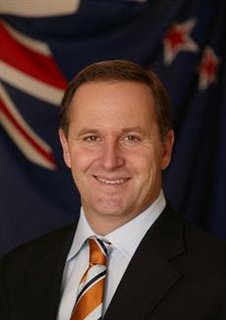 So John Key and Bill English, new leader and deputy of New Zealand's National Party, are to do battle against Helen Clark. Key, having assumed the mantle of the Party on November 27, has just announced his shadow cabinet.
So John Key and Bill English, new leader and deputy of New Zealand's National Party, are to do battle against Helen Clark. Key, having assumed the mantle of the Party on November 27, has just announced his shadow cabinet. [By the way, what the hell is this: "Pansy Wong gets ACC and Ethnic Affairs." Ethnic Affairs??]
The inevitable question being: who is this man? The article in Wikipedia is pretty thin gruel. We are told that he is more centrist than gentleman Don Brash, particular on social issues, which would possibly indicate a better showing in places like Auckland and Wellington. But to what degree would we see a hollowing out of conservatism to bridge the Kiwi urban-rural divide?
Is he, I don't know, a monarchist? A supporter of New Zealand's traditional flag? This doesn't sound good: The "Political Correctness Eradication role, established by Brash, has been "eradicated", said Key." The man from Helensville may have Helen shaking in her boots, but how about us? Should we be shaking too?
I'll be checking in from time to time to hear what our Kiwi readers have to say.
I knew it was only a matter of time before I'd get to quote Colby Cosh:
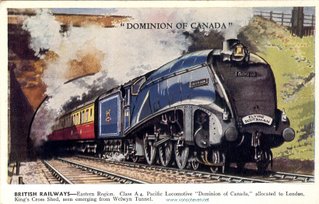 "I don't know anymore what the majority of Canada's intellectuals think they mean by "nation," though they're very clear on what it doesn't mean, and they'll set themselves on fire rather than concede that a French-Canadian might belong to any nation other than, or along with, Canada. I think I understand the true source of their anger. French Canada's claims to nationhood on genetic, historical, and cultural grounds are very strong indeed--arguably stronger than China's, for instance, and much stronger than the Ukraine's. To be an English Canadian, by contrast, is to be a stranded colonist, floating untethered on the plane of human varieties. Our ties of continuity with the past were cut in the hope that the French would cooperate and drift toward us; it is indeed terrible to contemplate the betrayal of that hope and our consequent state--so terrible, in fact, that Coyne can write that "[Quebeckers] have as much or more in common with other Canadians as they do with each other" and not even recognize that he has been driven totally round the bend by horror vacui.
"I don't know anymore what the majority of Canada's intellectuals think they mean by "nation," though they're very clear on what it doesn't mean, and they'll set themselves on fire rather than concede that a French-Canadian might belong to any nation other than, or along with, Canada. I think I understand the true source of their anger. French Canada's claims to nationhood on genetic, historical, and cultural grounds are very strong indeed--arguably stronger than China's, for instance, and much stronger than the Ukraine's. To be an English Canadian, by contrast, is to be a stranded colonist, floating untethered on the plane of human varieties. Our ties of continuity with the past were cut in the hope that the French would cooperate and drift toward us; it is indeed terrible to contemplate the betrayal of that hope and our consequent state--so terrible, in fact, that Coyne can write that "[Quebeckers] have as much or more in common with other Canadians as they do with each other" and not even recognize that he has been driven totally round the bend by horror vacui.I have to admit, that whole "community of communities" thing is looking better every minute. (And if we promise to be on our best behaviour, can we please have "Dominion of Canada" back?)"
Although he has come out against monarchy in the past, I'm really glad to see that Mader Blog understands the distinguishing features of the British parliamentary system:
A Parliamentary party is a collection of MPs who, on balance, support a common platform. A government is a ministry; it is a body of MPs who advise the executive as to the administration of the nation (ahem). It is necessary that all members of a government vote in for that government; it would be inconsistent for a member of the government to vote against the government of which he or she was a member. When a conflict of principles arises - as really ought to arise far more frequently than it appears to - the appropriate action for a minister is to resign from government and withdraw to the back benches. There is no shame in such an action; on the contrary, it is the very height of Parliamentarianism.Rather than vote against the Government of Canada (of which he was a member) on its parliamentary motion recognizing the Quebecois as a nation within a united Canada, Michael Chong, the former minister of intergovernmental affairs, did the honourable thing and resigned in order to abstain on the issue. He resigned on the principle that while he was still loyal to his leader and his party, he was loyal first to his country, and in all good conscience could not vote on a matter that gave recognition to an ethnic nation. It's moments like this that we can tell the difference between politician and parliamentarian. A politician is a populist, a man of the people. A parliamentarian is a man of honour.
That being said, Michael Chong is probably making too much of the issue, just as I had done earlier before understanding the finer points of the resolution. The government and parliament were not recognizing the province of Quebec as a nation, nor were they recognzing all Quebeckers. They were clearly recognizing only the French speakers of that province, les Quebecois, the ancestors of the first settlers of New France. Yes this is recognizing ethnicity, but it is no different from recognition of the other First Nations of Canada, such as the Cree, the Huron or the N'isga. So Canada lives. In all its tribalistic glory.
According to this article in today's Telegraph, a Somali working in Britain as a youth worker told a BBC radio 4 programme that
he felt more bound by the traditional law of his birth than by the laws of his adopted country. "Us Somalis, wherever we are in the world, we have our own law," he said. "It's not sharia, it's not religious — it's just a cultural thing."
Not British culture of course, which is where this is taking place. So much for people coming to Britain out of respect for its culture and traditions, including that of English Common Law that was adopted by so many all over the world, now a barrister warns that "there would be a formal network of Muslim courts within a decade."
At the same time as the UK unravels at the seams, Tony Blair has written to a black community newspaper, New Nation, that Britain's role in the slave trade was "shameful." Next year is the bicentenary of Britain's abolition of the slave trade, when it used its Royal Navy to actively fight the practice, and according to Blair: ‘[T]he bicentenary offers us a chance not just to say how profoundly shameful the slave trade was, but also to express our deep sorrow that it ever happened.’As Iraq continues to become more and more chaotic, and the management of the NHS back in England become more a fi\ocus of concern, it is reassuring to know that Blair is against a practice that was abolished nearly 200 years ago. By the way, I remember when he had also 'reflected' on the deaths caused by the Irish Potato Famine whatever that meant...
That's the claim made by the former head of the World Bank, James Wolfensohn. He warns that it will come before we know it and will radically alter the shape of our world. The West will have to get used to a world where the Chinese and Indians call the shots. It won't be pretty.
United we stand...Wealthy countries were failing to understand the impact of the invevitable growth of the two Asian powerhouses, Wolfensohn said in the 2006 Wallace Wurth Memorial Lecture at the University of New South Wales at the weekend.
"It's a world that is going to be in the hands of these countries which we now call developing," said Australian-born Wolfensohn, who held the top job at the global development bank for a decade until last year. Rich nations needed to try to capitalise on the inevitable emergence of what would become the engine of the world's economic activity before it was too late, he said.
"Most people in the rich countries don't really look at what's happening in these large developing countries," said Wolfensohn, who is now chairman of Citigroup International Advisory Board and his own investment and advisory firm.
Within 25 years, the combined gross domestic products of China and India would exceed those of the Group of Seven wealthy nations, he said.
"This is not a trivial advance, this is a monumental advance."
"I think you should all pay a little heed to Splendor Sine Occasu: he's the only one on target on this whole thread.
Harper has done nothing more than turn the implacable reality of the Quebec situation into a major lever of execution of his strategy (and it is a true and brilliant "blue ocean" strategy folks - go hit the business literature if you don't know what that means...) Contrary to the allusions of some on this thread, that strategy is all about a vision of Canada that is firmly rooted in clear principles. That that vision is so different from the Trudeau-esque one that has been accepted dogma in this country for forty years must be what is keeping people confused.
As Splendor says, Harper sees Canada as a confederation - and in many respects, as a rather loose one. He is deadly earnest about keeping Ottawa out of the provinces' hair on every matter that is not squarely the prerogative of the federal government. He is, equally earnest about his focus on those core areas of federal jurisdiction, and about keeping them under the exclusive federal purview. In all respects, this vision is 180 degrees opposed to the one that Liberals and Conservatives alike have cleaved to since... well, since almost forever. But it just happens to represent the only basis on which the continued existence of Canada is possible. And it is no accident that it took a Westerner as PM to see it.
The fundamental reality is this: to a large degree, the characteristics and interests of various parts of the country are mutually irreconcible, and the opposing forces are moving toward a critical point in a way they never have before. To the permanent and very real "separateness" of Quebec and the Quebecois we can now add the accelerating shift of the economic centre of gravity in Canada from Montreal-Toronto westward to Calgary-Vancouver. Those two realities cannot long coexist within Canada without some significant change in the political-structural foundations of the country. The only workable such change is the "devolutionism" which defines the Harper vision and strategy. Make no mistake folks: far from destroying Canada, Mr. Harper is doing the only thing possible to save it. Of course, the shape of the country that results will be different from the one we have been accustomed to, but get over it. Who was it that said, "facts can be difficult things?"
So call Quebec a "nation". More to the point, let them call themselves a nation. Let them call themselves a ham sandwich if they so desire. Ditto Alberta and everybody else. The confederalist structure will give everybody a lot of leeway. But none of this leeway will compromise the meaningful integrity of the country, because Mr. Harper has drawn a clear line in the sand. The wall around the areas of federal focus: international relations, defence and security, and basic economic policy; is now higher than ever. Whatever anybody thinks "nation" ought to mean in the context of this resolution, they will find out what it does not mean, at least in Mr. Harper's mind, if they attempt to breach that wall.
The important point in Harper's resolution was not the "nation" bit but the "within a united Canada" bit. It is entirely that latter part which is definitive in the whole thing.
The leeway which the move to a confederalist structure will create either will be, or it will not be, sufficient to satisfy Quebeckers. But the only possible further step for them is outright separation. Harper has made that more clear than ever before, which is precisely why Duceppe reacted so awkwardly in the immediate aftermath. Initially he was furious that, in a sense, the bluff had been called. Subsequently, he said, alright, separation it is. Whether Quebeckers as a whole will agree is another story - and he knows it."
POSTED BY WALSINGHAM
In an opinion piece that had me laughing in my seat, Gerald Warner tells David Cameron to remove the soother from his mouth on his first birthday as leader of the Conservatives. Ooogh! Cootchie, cootchie, cootchie! mocks Warner of the Baby King.
Also, be sure to read his Tory view on the unbridled libertarianism of Milton Friedman and his anarcho-capitalist son, David. This is a far cry from the swooning raves we heard earlier in the week.
"In the last quarter of the 20th century, the Right decisively won the important economic arguments. At the same time, few would demur from the view that in the so-called Culture Wars, the Left were ultimately victorious. More and more are dissatisfied with the effects of political correctness and cultural relativism."
And that ladies, is why The Monarchist exists. Save our heritage. Defend our values. Preserve our way of life.
 I'll be waxing Churchill for the next several weeks as I populate this blog with all the man's great speeches and quotes.
I'll be waxing Churchill for the next several weeks as I populate this blog with all the man's great speeches and quotes. There are many speeches of the last century that I would characterize as "great", and all of Churchill's certainly were. But the three greatest in my opinion were all spoken within a month of each other, at the moment Britain was being written off as a chicken about to get its neck wrung. Even many of those closest to Churchill (Lord Halifax anyone), thought the situation hopeless, but Churchill gave them a backbone, first with Blood, Toil, Tears and Sweat (our second runner up) in May 1940 that laid out Victory as the only honourable policy; followed by We Shall Fight on the Beaches on June 4th during the retreat at Dunkirk, when Winston was at his defiant best (first runner up); and finally Their Finest Hour on June 18th, as France capitulated leaving Britain alone and isolated against the Nazi menace:
"What General Weygand called the Battle of France is over. I expect that the Battle of Britain is about to begin. Upon this battle depends the survival of Christian civilization. Upon it depends our own British life, and the long continuity of our institutions and our Empire. The whole fury and might of the enemy must very soon be turned on us. Hitler knows that he will have to break us in this Island or lose the war. If we can stand up to him, all Europe may be free and the life of the world may move forward into broad, sunlit uplands. But if we fail, then the whole world, including the United States, including all that we have known and cared for, will sink into the abyss of a new Dark Age made more sinister, and perhaps more protracted, by the lights of perverted science. Let us therefore brace ourselves to our duties, and so bear ourselves that, if the British Empire and its Commonwealth last for a thousand years, men will still say, "This was their finest hour." "
Oh, sure the prime minister confounded the Quebec sovereigntists in Parliament yesterday, and denied them the opportunity to corner federalists on their own motion to recognize Quebec as a nation without so much as a mention of Canada. And yes he saved the opposition Liberals from imploding over the issue, threw a lifeline to the embattled Quebec premier, united the federalists and bolstered the Conservative’s flagging fortunes in la belle province in a brilliant masterstroke of political strategy that won him a standing ovation in the House of Commons from all parties except le Bloc Quebecois, not to mention wide applause from the country’s ink stained wretches. Oh, goodie. Wankfest galore. Nobody plays triangulation better than Stephen Harper, but what does it profit a man to gain the world and
First to the idiot savant who started this mess. Michael Ignatieff is Harper’s dream opponent, not because he shares a special affinity for the Americans and supported the Iraq War, but because Lord Iggy is a political klutz. The man comes waltzing in here fresh from thirty years of living in his ivory tower at Cambridge and Harvard, and opportunistically lunges for the altar of the Liberal Party of Canada (Mark Steyn said it was like watching a classical pianist at the burlesque) by recklessly wooing Quebec nationalists and promising to speak for those who believe that “Quebec is my nation, Canada is my country”. We just barely survived thirty years of constitutional wrangling and gnashing of teeth, only to have this wise fool promise us more. It was a stink bomb that needed to be contained. Harper, sensing danger for his Quebec caucus and the country at large, struck at the right moment to neutralize the separatist menace. (But did it? Just wait for the demands that a nation means special rights…) What rankles more than anything is to see Iggy all smiles with the press now, applauding Harper for following his leadership on the issue! Actually, Ig, Harper was going in for the kill. And the kill is you, come next election, but first he had to save you from losing the Liberal leadership.
There may be a way out of this nonsense, but it would take a little imagination, something beyond that six letter hoser of a word: C eh, N eh, D eh (Okay, three letters and three ehs). We might say that “nation” has never done justice to the idea of Canada, that the complexities of this country require a new word to describe who we are. A country that is predominantly British, French and American, one that Andrew Coyne calls “polyethnic, multilingual and transcontinental”, instead of that dreaded and divisive multicultural notion. For what we need is not something that segregates, differentiates, separates and alienates us, but a word that binds us together in loyalty and allegiance to the whole. Dominion was good in its day, Churchill’s “Great Dominion” even better, but I’m thinking of something less imperial and more federal in a way that still honours our former majesty. You know what I’m talking about, don’t you? Thy Kingdom Come to this glorious and free land we call Canada!
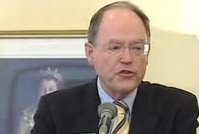
Dr Brash transformed National into a respected, potent and feared Opposition after it took a record drubbing in the 2002 election. He came within a sniff of winning the 2005 election, and would have won if Clark did not illegally spend over $800,000 of taxpayers money.
It's a total shame Dr Brash has resigned. He might not have been the "perfect politician" but his honesty and genuine concern for New Zealand would have made him a remarkable leader for this country. The media and all those small-minded dimwits creating scandals from nothing should be ashamed of themselves. I sincerely hope Helen Mugabe and her Welfare party are ousted next election
If Don Brash feels he has to resign then I think half of the Labour government should as well. If they are caught out they now legislate to make it legal. How come Benson Pope does not resign? What about Taito Philip Field?
Don Brash gets called a bigot, accused of only being interested in taking care of the interests of the wealthy, and of pandering to agenda of extremists. Why? For being an effective Leader of the Opposition and pushing alternative policies than the Government with the intention of making New Zealand better for all New Zealanders.
New Zealanders make a mockery of the entire concept of Democracy. Democracy is supposedly a system whereby citizens of a country make and informed decision on who is best to run the country. Personality should have nothing to do with the issue. Dr Brash is a highly educated man with a comprehensive knowledge of what makes an economy successful, the fact that he has some personal imperfections only makes him human. Apparently it is okay to be a homosexual, transvestite or any other 'special interest group' but heaven forbid you are just a normal bloke who (supposedly) flirts with another woman. As for the Exclusive Brethren - what have they actually done wrong? Would you all kick and scream so much if he had met with Muslims? Or Jews?
It seems that John Key will be the next leader, with a recent Auckland poll showing Key only 1.4 points behind Brash. Dr Brash's decision came with the Nationals ahead in the poll. The decision has left the party in crisis, set for their fifth leader in 9 years.
I have personally always favoured Dr Brash to Keys, Brash was a Gentlemen, a last of his breed and Dr Brash was always unfailingly courteous.
Gentlemen, it sadly looks like Helen Clark and the rest of her cronies have forced a great leader from Prime Ministeralship contention.
There goes a man of honour. Even in his resignation statement he stands up for the rights of the man responsible for the final nail.
But, to paraphrase the words of Voltaire, though I utterly reject Mr Hager's view of the National Party and of me, I defend his right to hold those views, and to publicise them.Dr Brash would have made an excellent Prime Minister. Having the intellectual capacity to understand that people are entitled to hold different views. Unlike the current regime.
John Key will be the next leader of the opposition and good luck to him. He can expect all sorts of shit to be flung at him. But I think we can safely expect a National rise in the polls from here. It may not be sustained but unless New Zealanders have completely lost their sense of fair play they will realise that a very good man has been done down unfairly today.
The Guardian (sigh) reports today that Cameron is being urged to ditch Churchill for Polly Toynbee. In a paper being published today, Greg Clark, 'a shadow minister and confidant of the Tory leader' writes:
The traditional Conservative vision of welfare as a safety net encompasses another outdated Tory nostrum - that poverty is absolute, not relative.
Churchill's safety net is at the bottom: holding people at subsistence level, just above the abyss of hunger and homelessness. It is the social commentator Polly Toynbee who supplies imagery that is more appropriate for Conservative social policy in the twenty first century.
Question: Who seriously considers the views of Canada?! The fact that this individual considers Canada's most important relationship to be with not the US or the mother country or the Commonwealth, or Europe but a country that spits on the values Canadians fought and died for is a disgrace.
-------
Dateline Washington, 8 November 2006. Donald Rumsfeld, President Bush's Secretary of Defense who resigned after the November election, has been "controversial" (to put it mildly) since things in Iraq started to go bad. When things were going better, in 2003 with coalition forces sweeping into Baghdad, the media doted on his every quip.
A strong admirer of Churchill, Rumsfeld has quoted him on many occasions lately, getting only into more hot water. In late August Rumsfeld said that his detractors reminded him of Hitler's appeasers: "Each one hopes that if he feeds the crocodile enough, the crocodile will eat him last." New York Times critic Frank Rich shot back on September 3rd: "He can quote Churchill all he wants, but if he wants to self-righteously use [sic] that argument to smear others, the record shows that Mr. Rumsfeld cozied up to the crocodile of Baghdad as smarmily as anyone."
In his departure remarks at the White House on October 9th Rumsfeld said, “I call to mind the words of Winston Churchill, who said something like this: ‘I have benefited greatly from criticism and at no time have I suffered a lack thereof.’” The Secretary quite properly admitted he was not quoting verbatim. The actual quotation is: "I have derived continued benefit from criticism at all periods of my life and I do not remember any time when I was ever short of it." (House of Commons, 27 November 1914).
Anorak, a British website "keeping tabs on the tabloids," took that up with a Churchill reference of its own: "As another wartime leader of old might have put it, he came, he saw, he almost conquered but lacked a viable and speedy exit strategy." Anorak referred to Churchill's comment on General Charles Monro, who took command of British forces at Gallipoli in October 1915 and supervised their evacuation: "General Monro was an officer of swift decision. He came, he saw, he capitulated." (The World Crisis II, 489).
We could have provided Donald Rumsfeld with much more pointed remarks:
"We do not resent the well-meant criticism of any man who wishes to win the war. We do not shrink from any fair criticism, and that is the most dangerous of all. On the contrary, we take it earnestly to heart and seek to profit by it. Criticism in the body politic is like pain in the human body. It is not pleasant, but where would the body be without it? No health or sensibility would be possible without continued correctives and warnings of pain." (House of Commons, 27 January 1940.)And in tribute to the department he was leaving:
"I am going to do something that has never been done before, and I hope the House will not be shocked at the breach of precedent. I am going to make public a word of praise for the War Office. In all the forty years I have served in this House I have heard that Department steadily abused before, during, and after our various wars. And if my memory serves me aright I have frequently taken part in the well-merited criticism which was their lot." (House of Commons, 2 August 1944.)We wish that Mr. Rumsfeld had come to us. We offer politicians of all persuasions a Churchillism for every occasion.
Richard M. Langworth, Editor, Finest Hour
The Churchill Centre
www.winstonchurchill.org
According to an article in today's Times,
Mr Musharraf attacked the West's strategy in Afghanistan yesterday, and said that the task could not be achieved by military action alone. He added that only Pakistan was implementing the right strategy. He called on the West to implement a plan of billions of dollars of aid to rebuild Afghanistan, just as the US spent billions of dollars rebuilding Europe after the Second World War.This "right strategy" seems to me to be exporting the terrorists who learn their skills in Pakistan to old Blighty and thus removing the threat of "the Taleban crossing the border to safe havens in Pakistan's largely lawless northwest provinces". For this the Pakistanis appear to be demanding the Anglo-Americans pay up roughly 10% of their combined federal budget as with the Marshall Plan...
As a counterweight to this site's tribute to historian David Starkey, I would recommend a perusal of today's Guardian which says that monarchies survive "by that liberal sprinkling of holy oil which tries to turn an accident of history into a national myth," and that historians like Starkey "should be exposers of this cheap glamour rather than its cheerleaders." What I find most offensive in this opinion piece, which goes on to illustrate how the Gurdian seems now to be little more than a conveyor of unremarkable nobody's opinions than actually analysing real issues and news, is the fact it denounces monarchists in Wales and Scotland as 'quislings.'
 Churchillian Quote of the Week
Churchillian Quote of the Week"Canada is the linchpin of the English-speaking world. Canada, with those relations of friendly, affectionate intimacy with the United States on the one hand and with her unswerving fidelity to the British Commonwealth and the Motherland on the other, is the link which joins together these great branches of the human family, a link which, spanning the oceans, brings the continents into their true relation and will prevent in future generations any growth of division between the proud and the happy nations of Europe and the great countries which have come into existence in the New World."
- Speech given at a luncheon in honour of Mackenzie King, Prime Minister of Canada, Mansion House, London, September 4, 1941.
Sir Michael Caine on England (From the Times: England Expects)
“I am very, very patriotic. Don’t get me started,” he warns. He frets that his beloved England is being overlooked as the other home nations enjoy devolution. His friend Sir Sean Connery has become a cheerleader for Scottish nationalism and Sir Michael is beginning to think he’s right. “I’m a very English man. And that doesn’t mean to say I don’t like foreigners and I hate all immigrants. I’m married to an immigrant. But I am not happy at the moment. Everybody seems to be represented but the English.Sir Sean Connery on Scotland (According to Sir Michael)
“There’s a possibility that a Scotsman is going to rule over me. A Scotsman who comes from a constituency where my member of parliament, who I elected, has no say whatsoever...
And there is an answer, given to me by my friend Sean: give Scotland its independence. Gordon Brown can be the prime minister of Scotland.”
 Oh, dear. Sir Elton John, our hitherto most Christian knight, is apparently suffering from one of his mood swings again. The Englishman who knelt in good faith before Her Majesty not too, too many years ago, and was knighted by the Supreme Governor of the Church of England, now wants to finger God and destroy His Church. And just for good measure, all the other Churches too.
Oh, dear. Sir Elton John, our hitherto most Christian knight, is apparently suffering from one of his mood swings again. The Englishman who knelt in good faith before Her Majesty not too, too many years ago, and was knighted by the Supreme Governor of the Church of England, now wants to finger God and destroy His Church. And just for good measure, all the other Churches too. Now, this may be counter to the whole ideal of chivalry thing, the one Charlemagne inspired with "fear God and maintain His Church". It may not be in lockstep with the first two commandments of the Knights Code: "I. Thou shalt believe all that the Church teaches, and shalt observe all its directions; II. Thou shalt defend the Church..."; but let's not be too hard on the poor chap – he probably mistook his knighthood as just the English version of a modern Emmy, or an Oscar, or an MTV music award, or some other Hollywood stimulated trinket of courtly self-love.
Another good for business, bad-tempered publicity stunt? Bollocks! Sir John and the Hollywood establishment are chivalrous to the bone. Just look at all the causes they support, just look at their countless charities, their unstoppable efforts at protecting the weak and the defenceless. Up with Hollywood, and down with the Church!
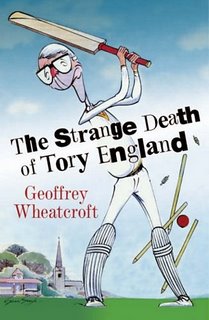 "Has the most successful species in British political history finally become extinct?" What is the state of English political liberties; where is the trust in slow historical progression, the loyalty and reverence to constitutional forms? Where is the spirit of Dryden, Johnson, Swift and Pope?
"Has the most successful species in British political history finally become extinct?" What is the state of English political liberties; where is the trust in slow historical progression, the loyalty and reverence to constitutional forms? Where is the spirit of Dryden, Johnson, Swift and Pope? Like the Jacobites of an earlier era, Geoffery Wheatcroft illuminates how traditional British conservatives have been perennially displaced and marginalised in the UK of today and into the future:
The Conservative party dominated British politics for 120 years from Disraeli's victory in 1874, culminating in an unprecedented eighteen-year spell in government after 1979. And yet at the very end of the century the Tories imploded so disastrously as to suggest the party might be doomed to follow the Liberals into oblivion...Get your copy at Westminster Books and shed a tear for England.
The Strange Death of Tory England goes on to show how the gradual eclipse of military virtues and patrician ideals came to discredit Toryism, how the party tore itself apart over Europe and how it suffered from the malign influence of a quasi-intellectual New Right which held sway in the Tory press. Wheatcroft demonstrates brilliantly how two profound truths explain the Conservatives' decline: that the Right had won politically, but the Left had won culturally; and that it was possible to win the battle, but lose the argument.
ANGLO-FRENCH RELATIONS IN THE DOMINION OF CANADA AND THE IMPERIAL FEDERATION MOVEMENT
“THE KEYSTONE OF THE CANADIAN NATION IS THE FRENCH FACT; the slightest knowledge of history makes this platitudinous. English-speaking Canadians who desire the survival of their nation have to co-operate with those who seek the continuance of Franco-American civilisation”.
It has been written that John Diefenbaker’s great failure as Prime Minister after the Second World War – the last period in which ‘Britishness’ was seen as central to Canadian identity – was his failure to find this milieu for co-operation with French-Canadian conservatism. Between 1958 and 1962, Diefenbaker had fifty Quebec seats behind him, and yet found no Quebecois lieutenants. While it is true that he was unfortunate in the premature death in 1960 of J.M.P. Sauvé, who could well have become the first French-Canadian Tory PM, Diefenbaker’s failure was at root systemic, not contingent. Nor is it true that this failure to engage with French Canada was simply the manifestation of indifference. He, like all other Anglo-Canadian nationalists for more than a century, failed to appreciate that their vision of a united Canada was incompatible with that of Quebec.
This is to say, that Anglo-Canadians’ vision for the Dominion was involved “one united Canada in which individuals would have equal rights irrespective of race or religion…As far as the civil rights of individuals are concerned, this is obviously an acceptable doctrine. Nevertheless, the rights of the individual do not encompass the rights of nations…The French Canadians had entered the Confederation not to protect the rights of the individual but the rights of the Nation”. For them, equal rights in the sense usually implied in British political discourse were a recipe for being swallowed up by an amèricanisme saxonisante. The fact that the rhetoric and practice of multiculturalism in modern Canada has had no concomitant tendency to diminish Quebecois nationalism is a clear indication that this is so – showing respect for the residual customs of ethnic minorities such as Ukrainians and Koreans is one things, but the French-Canadians are concerned with being a nation-within-a-nation, an ambition for which treating every citizen equally would spell disaster.
What this also reveals is that the Quebecois have always shrewdly discerned a fact of which Anglo-Saxons the world over have often been only hazily aware, if at all: that whereas the Cape Dutch, the French Canadians, and other European colonial populations whom the British absorbed into their Empire tended to have no place in their hearts but for their own communities, British colonists the world over always felt part of a far-flung global community whose spiritual centre was the British Isles. From Britain’s earliest attempts at colonisation until well into the twentieth century, millions of people in the British colonial empire who had never, and would never, visit Britain itself continued to think of the British Isles as ‘Home’, tendebant manus ripæ ulterioris amorē.
Continue Reading Edward Harris - Whose Providence?
POSTED BY CATO, Edward Harris in London, England
Her Majesty Queen Elizabeth II, as Queen of New Zealand accompanied by the Duke of Edinburgh has officially unveiled a memorial in Hyde Park to commemorate the long relationship between New Zealand and the United Kingdom as well as to honour New Zealand’s war dead.
The New Zealand Memorial will serve as a focus of remembrance of the shared sacrifice during the two World Wars and other military operations.
Several members of the Royal Family also attended the ceremony including Their Royal Highnesses the Prince of Wales and the Duchess of Cornwall, Prince William, the Duke of York, the Princess Royal and the Duke of Kent.
British Prime Minister Tony Blair and New Zealand's Prime Minister Helen Clark were also in attendance.
The memorial known as the Southern Stand, consists of 16 cross-shaped vertical bronze pillars - each one representing a different aspect of New Zealand life and inscribed with text, patterns and sculptures.
Thirty-two veterans and over 250 Service personnel from the New Zealand Defence Forces were present at the event - the largest contingent of New Zealand forces to be seen in the UK since Her Majesty’s Coronation in 1953
The Prince of Wales, the Duchess of Cornwall and Prince William attended the event.
The Prince of Wales in his Royal New Zealand Air Force uniform.
Her Majesty the Queen meets her New Zealand Prime Minister Helen Clark.
Maori welcoming ceremony.
Her Majesty the Queen inspecting the Royal Guard of Honour.
"The memorial is a symbol of our common heritage and of New Zealand’s distinct national identity," said Prime Minister Helen Clark in a speech.
The Queen and the Duke of Edinburgh along with Prime Ministers Blair and Clark honour New Zealand's war dead.
The Queen greeted the 34 New Zealand veterans at the end of the ceremony.
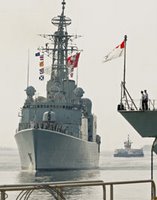 My former warship, HMCS Athabaskan, the one I served in (we serve in ships, not on them) during work ups to the first Gulf War in 1990, has made a great splash in the media over the past 24 hours rescuing stranded and shipwrecked Nova Scotians north of Bermuda.
My former warship, HMCS Athabaskan, the one I served in (we serve in ships, not on them) during work ups to the first Gulf War in 1990, has made a great splash in the media over the past 24 hours rescuing stranded and shipwrecked Nova Scotians north of Bermuda.HMCS Athabaskan had been operating in the region as part of an experiment, involving the Canadian naval task group, an air expeditionary unit and a landing force all working together, to explore the possibility of integrating a seaborne and sea-based combat force.For these lucky Maritimers, talk about being in the wrong situation at the right place at the right time.
Hip hip hooray, to the officers and crew of Her Majesty's Canadian Ship!
Read Douglas Murray at the New Cultural Forum. Speaking to the Institute of Commonwealth Studies, Mr. Murray delivers a warning eerily reminiscent of our times:
‘Europeans are going to have to start asking: do we want to keep what we have? Do we want to salvage something? Or is there genuinely nothing which we wish to save?’ he said. ‘I recommend to you – go to Amsterdam and walk around. Look at the woman in the burkha, and the druggy baby-boomer running the cannabis café and ask yourself who is going to be running this place in twenty years time.’Hat tip and thanks to Franck Guillory for sending me this news from London NCF.
Also read Melanie Phillips: The multicultural menace
And Melanie Phillips, author of Londonistan
Melanie Phillips: The British Broadcasting Jihad
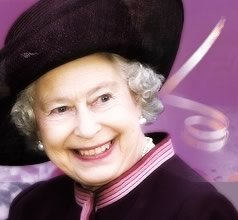 Andrew Coyne takes a page from The Monarchist and declares we should do our duty For King and Country.
Andrew Coyne takes a page from The Monarchist and declares we should do our duty For King and Country. In a similar heartfelt vein, he also lays out his rationale for why we should dispense with dual citizenship and be forced to choose (renounce or pronounce) our loyalty to Canada. I agree with him with one important caveat: that we should also continue to recognize our fraternal loyalty to our collective Queen who is sovereign of 16 other nations, by reaffirming our status as Commonwealth citizens.
The 1977 Immigration Act already does this, when it renounced our status as British subjects, and that should continue. There is nothing inconsistent with that particular duality, since there is also the constitutional reality of our familial allegiance to the British Crown as recognized in the Statute of Westminster, which is more than a UK statute, but a treaty that we signed in 1931.
But then again, what's the point. If our status as Commonwealth citizens no longer confers any special advantages or obligations to one another in the larger context, then the gig is up. Read David Cameron: Conservatives commit to cut non-EU immigration. The Commonwealth is dead, long live the EU.
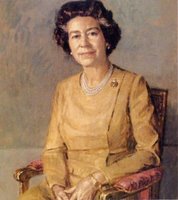 Our latest casualty over here in the United Kingdom was 19 year-old Jamie Hancock, a Kingsman serving in the Duke of Lancaster's Regiment (Kings, Lancashire and Border) currently stationed in Basra, Iraq. (Her Majesty, the Duke of Lancaster, is of course the regiment's Colonel-in-Chief).
Our latest casualty over here in the United Kingdom was 19 year-old Jamie Hancock, a Kingsman serving in the Duke of Lancaster's Regiment (Kings, Lancashire and Border) currently stationed in Basra, Iraq. (Her Majesty, the Duke of Lancaster, is of course the regiment's Colonel-in-Chief). I stop to mention this because I had never heard of this rank before (essentially the equivalent of a private serving in the infantry), which today is limited in usage -- a unique honour bestowed upon privates serving in the King's Division, all of the regiments domiciled in northern England.
I stop to mention this to pay tribute to Jamie Hancock, a soldier of the War on Terror. T'is the season to honour the sacrifice of such men.
Please sign the petition at The Dominion Institute to beseech the Canadian government to honour the last Great War soldier with a state funeral. Their goal is 50,000 signatures by November 11. I was number 8,866 at noon time today. Australia already had a state funeral for their last Gallipoli veteran, and Britain plans to hold a national memorial at Westminster Abbey for their last Great War hero. I think we would be sadly remiss if Canada didn't do the same.
LAST REMAINING BRITISH IMPERIAL GREAT WAR SOLDIERS:
1. Ross, John Campbell - last Australian digger
2. Clemett, Victor Lloyd - Canadian
3. Powers, Gladys - Canadian
4. Wilson, Dwight (Percy) - Canadian
5. Babcock, John F. - Canadian
6. Choules, Claude Stanley - British
7. Lucas, Sydney (Syd) - British
8. Young, William (Will) - British
9. Allingham, Henry - British
10. Bolaise, Violet - British
11. Cummins, Kenneth - British
12. Mayne, Phillip - British
13. Patch, Harry - British
14. Stone, William (Bill) - British


